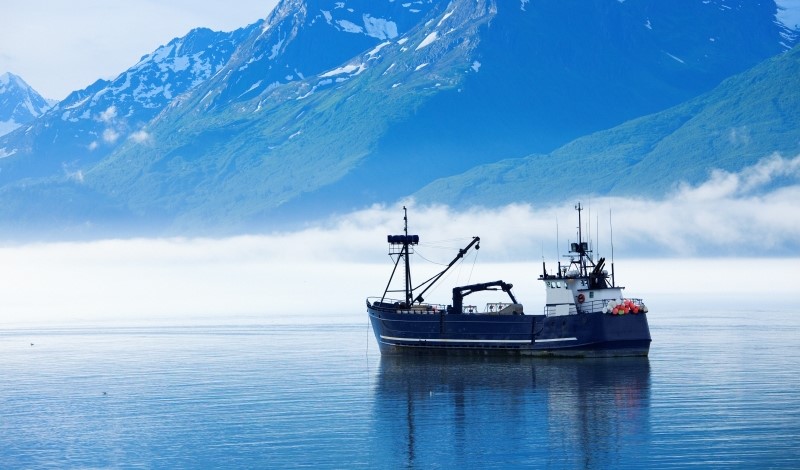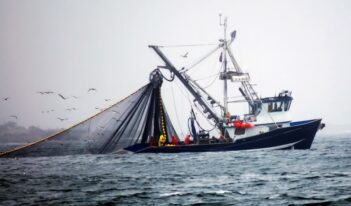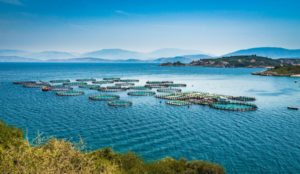
Scholar recommends that legislators tighten restrictions on unlawful fishing.
Americans spend over $100 billion annually on seafood. Yet experts predict that destructive fishing practices will decrease the global fish supply, exacerbating the depletion of this common food resource.
In a recent article, Madison Landry of Louisiana State University stresses that, as a top seafood importer and producer, the United States must do more to combat illegal and unregulated fishing worldwide. She argues that the federal government should address the gaps in the Seafood Import Monitoring Program (SIMP) by expanding the program’s coverage to all species and throughout the entire supply chain.
Under SIMP, the National Oceanic and Atmospheric Administration requires importers to collect and report data on when, where, and how the seafood was harvested for species identified as most at risk from unlawful fishing practices—activities that bypass existing laws and undermine sustainable fishing goals. Prohibited activities include fishing without a license, misreporting catches, fishing in restricted areas, targeting prohibited species, and operating in unregulated areas.
Although Landry acknowledges that SIMP enables the discovery of illegal, unregulated, and unreported fishing practices, a vast number of violations remain undetected. For example, a report from the U.S. International Trade Commission found that the United States imported $2.4 billion of seafood from illegal, unregulated, and unreported fishing in 2019.
Currently, SIMP only covers certain seafood species from being imported in the United States, leaving out critical components of the seafood supply chain, such as bait, notes Landry. According to Landry, this lack of coverage facilitates the entry into the market of fish that sellers obtained illegally, threatening efforts to conserve ocean resources and prevent overfishing.
Landry points out that only 13 species are identified as most at risk by the National Oceanic and Atmospheric Administration. Some of the most popular seafood Americans consume, such as clams, Alaska pollock, and salmon, are not recognized as at risk. As a result, 60 percent of all seafood imported to the United States is not subject to SIMP supervision, warns Landry.
In response to these shortcomings, Landry proposes that the federal government expand SIMP by taking a “bait-to-plate” approach that would oversee all imported seafood species and search for illegal, unreported, and unregulated activities across the entire supply chain. This “bait-to-plate” approach would require the federal government to monitor fish from before they are caught until the point of final sale, Landry explains.
To conserve fishing stock, she recommends that federal legislators require reporting for all imported seafood species. According to Landry, expanding SIMP to all species could discourage fishermen engaged in unlawful practices from deliberately mislabeling imports to escape punishment. Furthermore, including all species under SIMP would ensure seafood that Americans frequently consume is obtained legally and sustainably, emphasizes Landry.
Under this model, the National Oceanic and Atmospheric Administration would mandate seafood importers to provide information about entities in their supply chain and impose strict labeling requirements that disclose information about the catch, suggests Landry. She contends that requiring fishermen to disclose information about their catches, such as the country of origin, provides regulators with more opportunities to detect unlawful fishing practices. Landry predicts that fishermen engaged in illegal fishing activities would be deterred from attempting to import their catches because of the enhanced reporting requirements.
Opponents of expanding SIMP claim that it would force companies to eliminate jobs due to excessive compliance costs. Landry, however, suggests that illegal practices pose a larger threat to seafood businesses. Expanding the program would protect rule-abiding fishermen because they would have fewer violators that compete with them in the market, explains Landry.
Landry recognizes that increasing SIMP’s coverage to all seafood imports across the supply chain would not completely eradicate illegal, unreported, and unregulated seafood imports. To improve the detection of these practices, she recommends federal regulators leverage technology to detect vessels participating in unlawful fishing. For example, all importers could be obligated to provide their unique maritime identification as a condition of trade, she suggests.
Crucially, according to Landry, applying SIMP to all seafood species from “bait-to-plate” could decrease fish entering the U.S. market that fishermen catch illegally. By addressing the shortcomings of SIMP, federal regulators would curtail harmful fishing practices, protecting the global fishing supply for future generations, concludes Landry.



